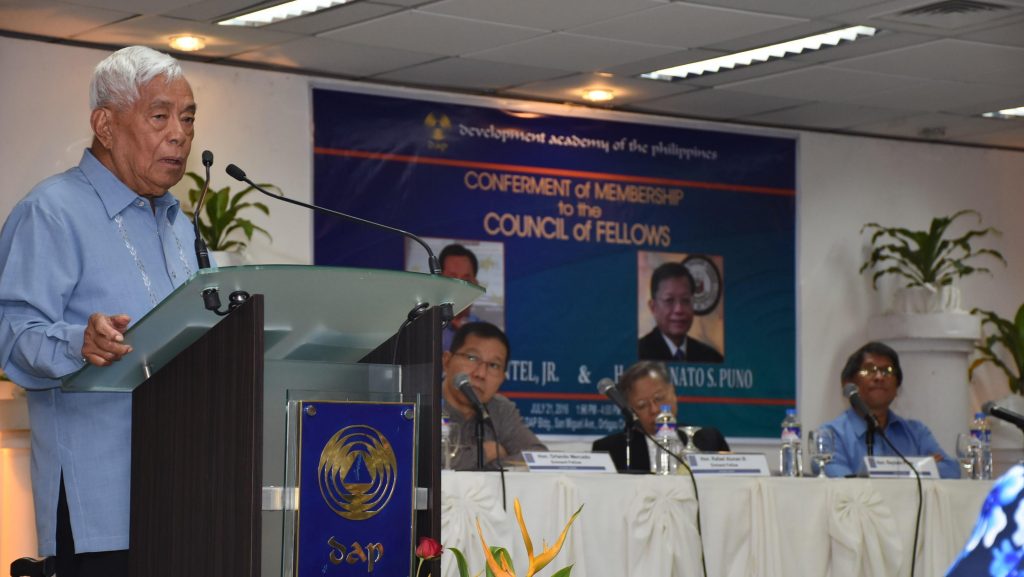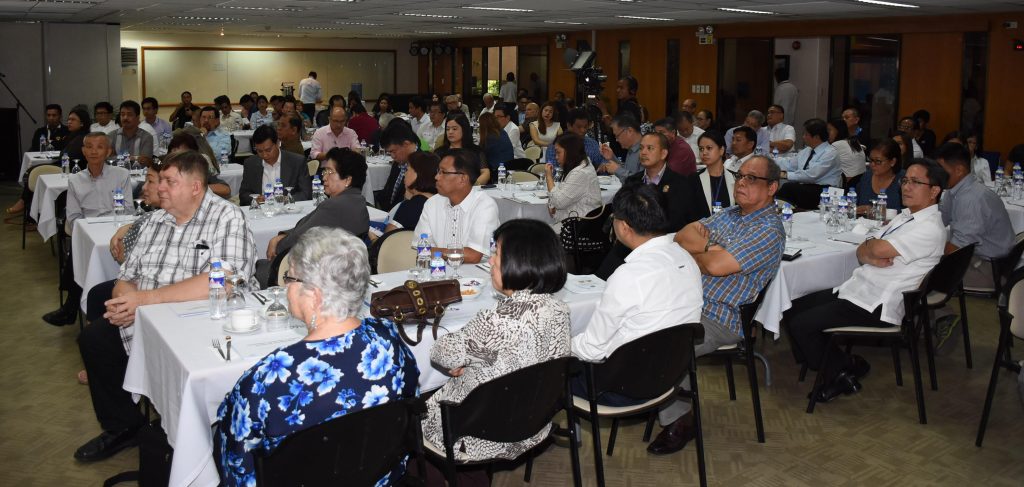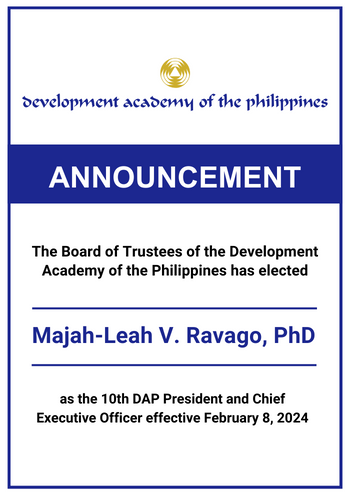
Federalism – and the more equitable distribution of powers to the country’s regions – is the key to the national progress that everybody has been yearning for in the Philippines.
This was the gist of former Senate President Aquilino “Nene” Pimentel Jr.’s presentation at the Forum on Federalism sponsored by the Development Academy of the Philippines’ Council of Fellows at the Virata Hall of DAP Pasig.
Pimentel, who together with former Supreme Court Chief Justice Reynato Puno was the chief speaker at the forum that also served as an occasion for the 0conferment of the two men’s membership to the DAP Council of Fellows, said that government powers have been so concentrated in the central government in Metro Manila that the regional or local governments have been paralyzed into being so dependent on the central government even in matters affecting them directly.
11 federal states
Under Pimentel’s proposal for a federal system, the country shall be divided into 11 federal states. These are to be created basically out of the administrative regions already existing. These will include four federal states in Luzon – the Federal States of Northern Luzon, Central Luzon, Southern Tagalog, and Bicol; four in the Visayas – the Federal States of Eastern Visayas, Central Visayas, Western Visayas, and Minparom composed of Mindoro, Palawan, Romblon and Marinduque; and three in Mindanao – the Federal States of Northern Mindanao, Southern Mindanao, and Bangsamoro, which could be further subdivided into Mainland Muslims composed of Maranaws, Maguindanaos and subtribes, and Off-Shore Island Muslims or those in Basilan, Sulu and Tawi-Tawi.
Metro Manila, meanwhile, will be converted into a Federal Administrative Region covering 16 cities and one municipality similar to Washington, D.C. in the United States, New Delhi in India or Kuala Lumpur in Malaysia, all of whom are using the federal system of government.
Secessionist movements
Pimentel said that the secessionist movements of various Moro groups that have existed since the Spanish era could finally be solved not by force but by federalizing the country and converting the Autonomous Region of Muslim Mindanao into a Bangsamoro Federal State.
He said the “imbalance” in the distribution of resources among LGUs has not only fueled the armed rebellion in Mindanao against the government but has also hampered the speedy development of the local communities and of the people residing in those communities.
“Government powers are so concentrated in the central government in Metro Manila that even during Typhoon Yolanda that hit Leyte and Eastern Visayas, it was the Department of Social Welfare and Development Secretary, Dinky Soliman, that took charge of the distribution of relief goods from the central government,” Pimentel said.
Devolution of powers
The former Senate President, who is now into public sector leadership advocacy through the Pimentel Institute of Leadership and Governance, is widely recognized as the father of the Local Government Code of 1991, which has tried to devolve certain powers of the central government and the functions of three departments – Agriculture, Health, and Social Welfare and Development – to the local government units.
“The greatly centralized, unitary feature of the government persists, however,” Pimentel pointed out. “Despite the passage of the Local Government Code, the system of government of the country is still highly centralized and unitary as opposed to the federal system.”
The situation, Pimentel stressed, therefore calls for the adoption of a “concrete, doable, practical plan” to speed up the development of the country and its people and dissipate causes of unrest by installing a federal system of government with a presidential form. Such a new system would require amending the present Constitution.
Present features to remain
Despite such an amendment, however, Pimentel said certain features of the present government will remain, including the existence of only one Constitution, one armed forces, one flag, one central bank, one monetary system, one foreign policy, and one public education system.
Pimentel suggests, however, that the manner of settling disputes be determined by who are the litigants involved. If the disputing parties are both Muslims, then the Shariah law should apply. If the dispute involves a Muslim and a non-Muslim, then the national law should apply.
The former lawmaker prefers retaining a presidential form of government under a federal system where a president and vice president will be elected nationwide but in tandem for a term of six years without reelection. Both officials, however, will now be required to be college degree holders.
A bicameral Congress that will enact laws for the federal republic shall also be elected, with the Senate members being elected nationwide and the Representatives being elected by district.

Significant increase
A significant increase in the number of senators who will be elected by their respective federal states, however, will take place, with six senators for each of the 11 federal states being elected, another six for Metro Manila and nine for overseas Filipinos for a total of 72.
Pimentel justified the increase by citing the significant rise in the country’s population from 20 million at the time 24 senatorial slots were mandated to the present when the population has soared to 104 million. He said an increase in the members of the Lower House may be justified similarly.
The long-time legislator-lawyer also pointed out other countries whose population is not even as big as that of the Philippines but have in fact significantly more senators on a per-head basis than the number being proposed for the country under a federalized system. These include the United Kingdom whose 60.9 million population is served by 618 senators, France (64 million, 331 senators), Italy (52 million, 315 senators), Spain (40 million, 264 senators), Egypt (81.7 million, 264 senators), Thailand (65.4 million, 150 senators), Ethiopia (78 million, 108 senators), Australia (20.6 million, 76 senators), Malaysia (25 million, 70 senators), and Ireland (4.1 million, 60 senators).
Local setup
Despite the said arrangement, each province, city and municipality will still have their own governors, mayors and local officials under the existing setup on top of the governor and vice governor for each federal state.
Every state will also have a unicameral state legislature that will enact laws for the governance of the state and where three state legislators will represent every province and city and three sectoral representatives will represent farmers, fisher folk and senior citizens in every province and city.
Despite the increase in number of senators and members of the House, revenue shares for the federal states and LGUs will increase, and the allocation of revenues will use all revenues – not only taxes collected by the Bureau of Internal Revenue – as basis, with the federal state getting 80 percent of the shares and the federal or national government 20 percent.
70 percent share
Some 70 percent of the federal states’ share will go, on the other hand, to the provinces, cities, municipalities and barangays while 30 percent will go to the federal state government.
Under this formula, Pimentel said the shares of the provinces, cities, municipalities and barangays will be bigger than what is currently provided for under the local government code.
The veteran lawmaker said that to address the reality that not all the federal states would be on equal footing in terms of resources and opportunities, an equalization fund administered by the federal government to assist states in dire need of development funds should be created. The federal states should be represented in the authority administering the said equalization fund.
The well-attended forum lasted more than three hours in a testimony to the great interest various sectors have in the proposed federal system.

Among those who came, besides Pimentel and Puno, were Senator Aquilino “Koko” Pimentel III, former Senator Orlando Mercado, Fr. Edicio de la Torre, former Budget Secretary Salvador Enriquez, former Interior and Local Government Secretary Rafael Alunan, former Social Welfare and Development Secretary Corazon Alma de Leon, Civil Service Commission Chair Alicia de la Rosa-Bala, Party-list Representative Ron Salo, Presidential Legislative Liaison Office Undersecretary Bernardo Sayo, and University of the Philippines Vice President for Public Affairs Prof. Prospero de Vera. – Bert A. Ramirez




